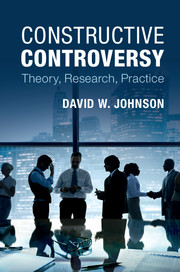Book contents
- Frontmatter
- Contents
- List of figures
- List of tables
- Acknowledgments
- 1 Underlying foundations of constructive controversy
- 2 The nature of constructive controversy
- 3 Theory of constructive controversy
- 4 The processes of constructive controversy and concurrence seeking
- 5 The outcomes of constructive controversy
- 6 Conditions mediating the effects of constructive controversy
- 7 Constructive controversy and decision making
- 8 Constructive controversy in education
- 9 Constructive controversy and political discourse in democracies
- 10 Constructive controversy, creativity, and innovation
- 11 Constructive controversy and building and maintaining peace
- 12 Conclusions
- References
- Index
6 - Conditions mediating the effects of constructive controversy
Published online by Cambridge University Press: 05 June 2015
- Frontmatter
- Contents
- List of figures
- List of tables
- Acknowledgments
- 1 Underlying foundations of constructive controversy
- 2 The nature of constructive controversy
- 3 Theory of constructive controversy
- 4 The processes of constructive controversy and concurrence seeking
- 5 The outcomes of constructive controversy
- 6 Conditions mediating the effects of constructive controversy
- 7 Constructive controversy and decision making
- 8 Constructive controversy in education
- 9 Constructive controversy and political discourse in democracies
- 10 Constructive controversy, creativity, and innovation
- 11 Constructive controversy and building and maintaining peace
- 12 Conclusions
- References
- Index
Summary
INTRODUCTION
Ignac Semmelweiss, in 1847, very forcefully told his fellow physicians to wash their hands before delivering babies. Although he did not know why, he had concluded that more babies and mothers would survive if the attending physicians' hands were clean. He tried to explain that from treating people with various diseases and doing autopsies on women who had died of childbed fever, a “morbid poison” was somehow on physicians' hands, which was then transferred to the women in labor. Therefore, Semmelweiss ordered his own medical staff and students to wash their hands with a chlorine antiseptic solution before treating a patient. The death rates from childbed fever dropped radically thereafter. But when he argued that his colleagues were murdering their patients through dirty hands, his colleagues became defensive and refused to change their behavior. No one knows how many women died because Semmelweiss's arguments created defensiveness and closed-minded rejection of his thesis rather than acceptance and appreciation. Semmelweiss did not create the conditions under which his thesis and supporting arguments would be listened to. Those conditions are discussed in this chapter.
CONDITIONS MEDIATING THE EFFECTS OF CONTROVERSY
Although controversies can operate in a beneficial way, they will not do so under all conditions. As with all types of conflicts, the potential for either constructive or destructive outcomes is present in a controversy. Whether there are positive or negative consequences depends on the conditions under which controversy occurs and the way in which it is managed. These conditions and procedures include (a) the social context within which the controversy occurs, the heterogeneity of participants, the amount of relevant information distributed among participants, and the social skills of participants (Johnson & Johnson, 1989, 2007, 2009b).
Cooperative context
The context in which conflicts occur has important effects on whether the conflict turns out to be constructive or destructive (Deutsch, 1973). There are two possible contexts for controversy: cooperative and competitive (Johnson & Johnson, 1979).
- Type
- Chapter
- Information
- Constructive ControversyTheory, Research, Practice, pp. 108 - 118Publisher: Cambridge University PressPrint publication year: 2015



